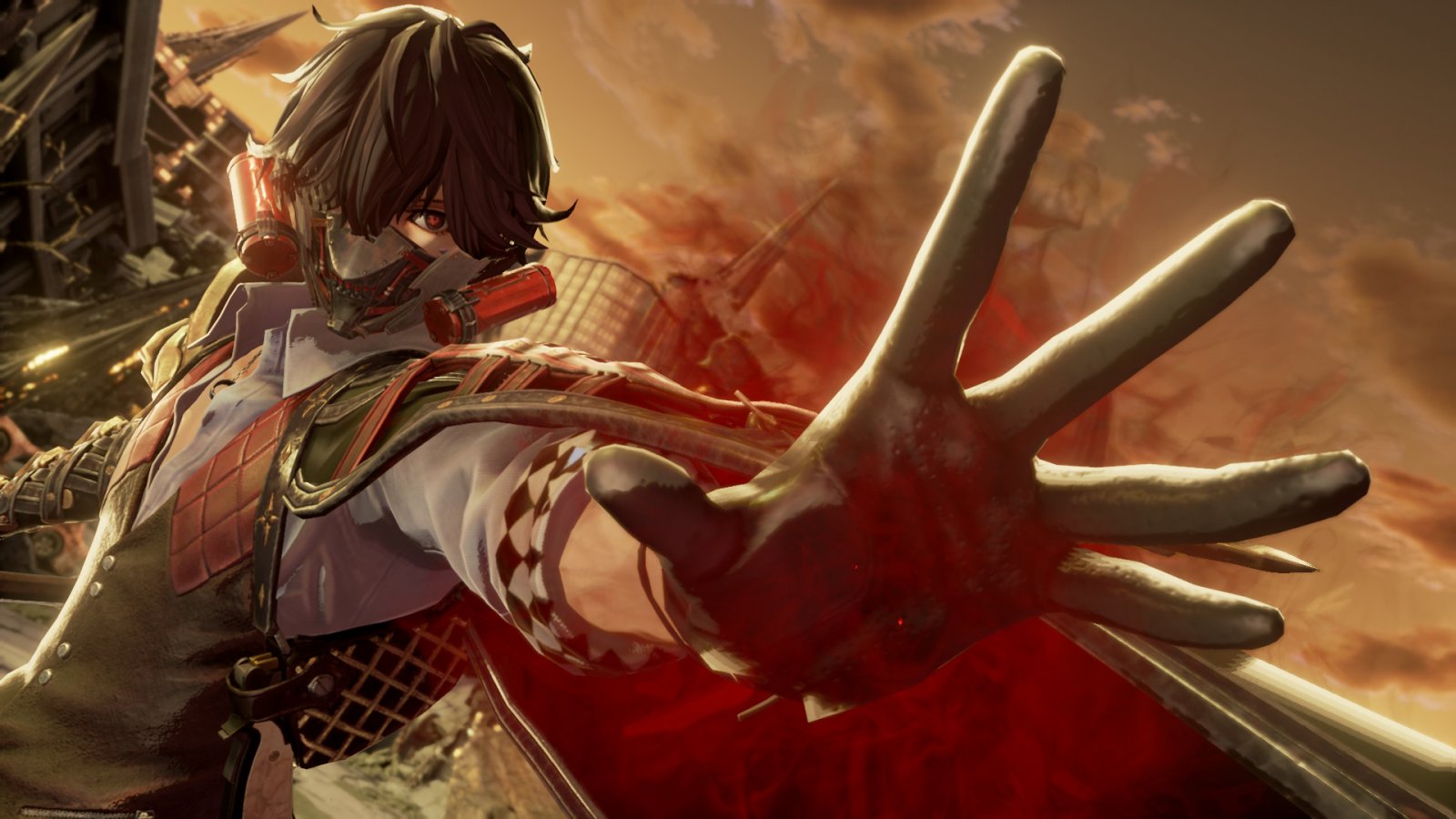Edited by: Jade Swann
CODE VEIN is a “Souls-like” RPG that offers a more anime-style to its characters. You’re a revenant with unique powers exploring a world that has fallen into ruins, searching for survivors and battling the ranks of the Lost along the way. Those looking for a challenge that offers replayability have come to the right place.
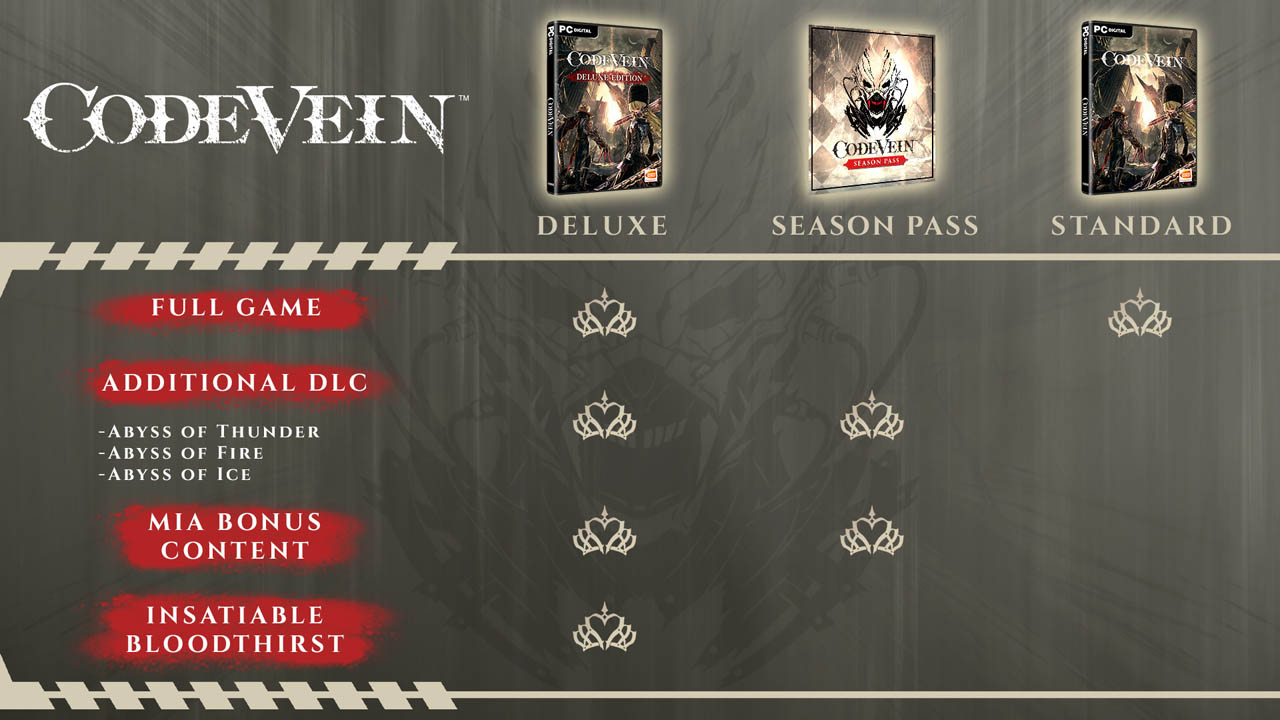
CUSTOMIZE
Your first task when starting a new game can take time: customizing your character. You don’t have simply a handful of presets that confine you, but rather a robust system that permits creativity. While specific parameters are missing, such as more detailed physical characteristics with which to fine tune your revenant, you have quite a few options for hair color and highlights, eye shape and positioning, and a vast array of accessories to place on your character. A few of these weren’t exactly easy to equip and have them look how I’d hoped, but you may adjust the exact positioning of these accessories. It just might take some trial and error. There are also various outfits from which you may pick, and you can customize the color schemes a fair bit, but there might be an outfit or two you wish was in the game. What’s particularly handy is that you can save appearances and rework a character you’ve been playing — even the hair and eyes you can redo later.
The other bulk of customization options lie in your equipment and Blood Codes. You may equip two different weapons and a blood veil (primarily responsible for defense and resistances, although certain weapons also affect these parameters), so long as your stats meet the requirements for the equipment. Blood Codes are different classes, although their setups are highly versatile. These classes dictate your stats, scaling, equipable weapons, and armor, but have no say in what passive and active skills you may use. Although, you must equip a particular Blood Code for skills you’ve yet to master (unless you have the materials to max out your proficiency); after that, you can swap back to your preferred Blood Code at any time and equip the newly mastered skill. At times, these classes didn’t feel well-defined; there wasn’t really anything unique to them, save for when comparing stats and health. So long as the class complimented my playstyle and weapon loadouts, I never really saw a reason to swap to another class, save for when I acquired a new skill I wanted to master. For bosses, however, I always ended up switching to a tankier Blood Code.
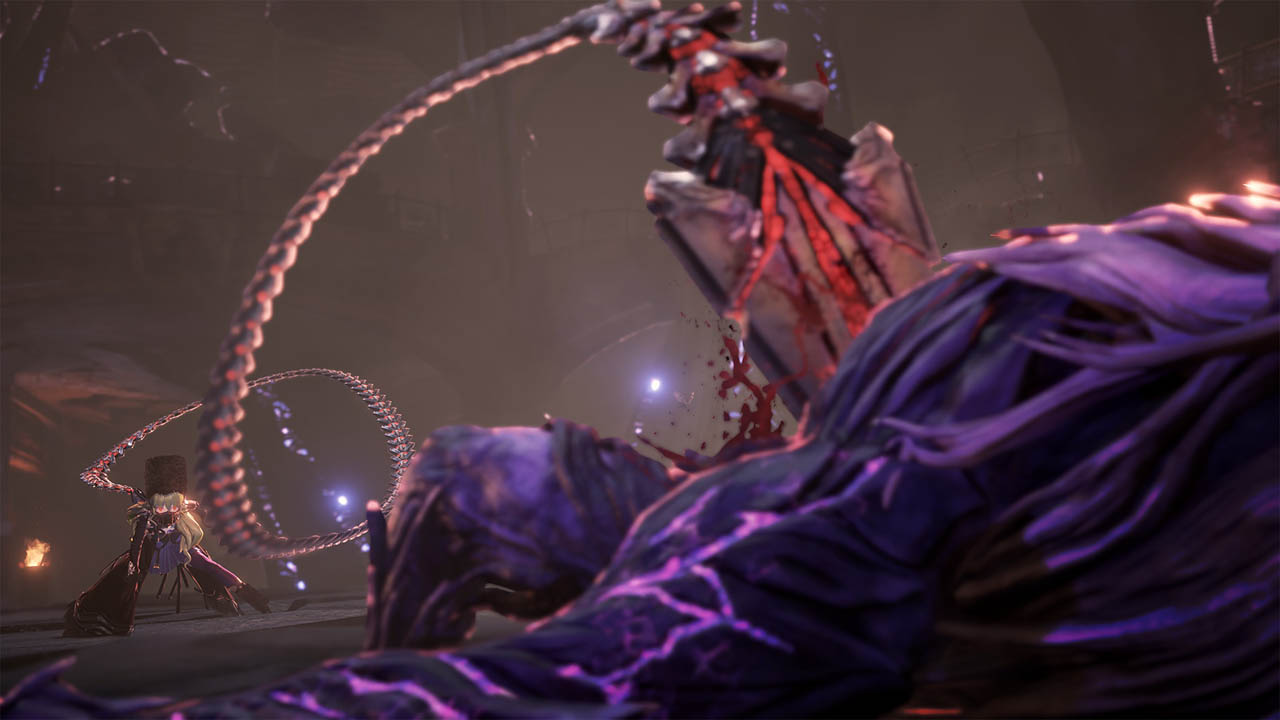
REAP THE REWARDS
Bosses drop a unique weapon as a reward. Unfortunately, you can’t replay a boss on the same playthrough to get duplicates of their weapon in case you want to transmute them and still have an unmodified version. This wouldn’t be problematic if once you’ve transmuted a weapon, you could endlessly transmute it back and forth without having to repay the costs. The amount of haze (the game’s currency) isn’t too much after a certain point, but Chromes aren’t the easiest item to acquire — the best way to receive these is from NPCs at your base through trading for trading points. You obtain trading points by offering people valuables. The more they like the item, the more points.
There are various ways to acquire new skills (gifts): Blood Codes offer various ones, but these take haze to acquire; you may also find mastery items during your travels, instantly granting a skill that’s mastered and equipable immediately. The other way is through Vestiges, items which permit you to unlock the “broken” gifts in a Blood Code. Until you find and restore them, you can’t acquire the gift to which they’re attached. The function of Vestiges isn’t only to restore gifts, although that is their most tangible benefit. When restoring them, you get transported into a Memory Echo, allowing you to experience a series of past events related to the characters in the game. They complement the storyline by giving background information and feature emotionally moving music that pairs nicely with the events depicted. Viewing multiple in a row after acquiring Vestiges while exploring can produce tedium since the Memory Echoes progress a bit slowly. But, they’re worth watching regardless.
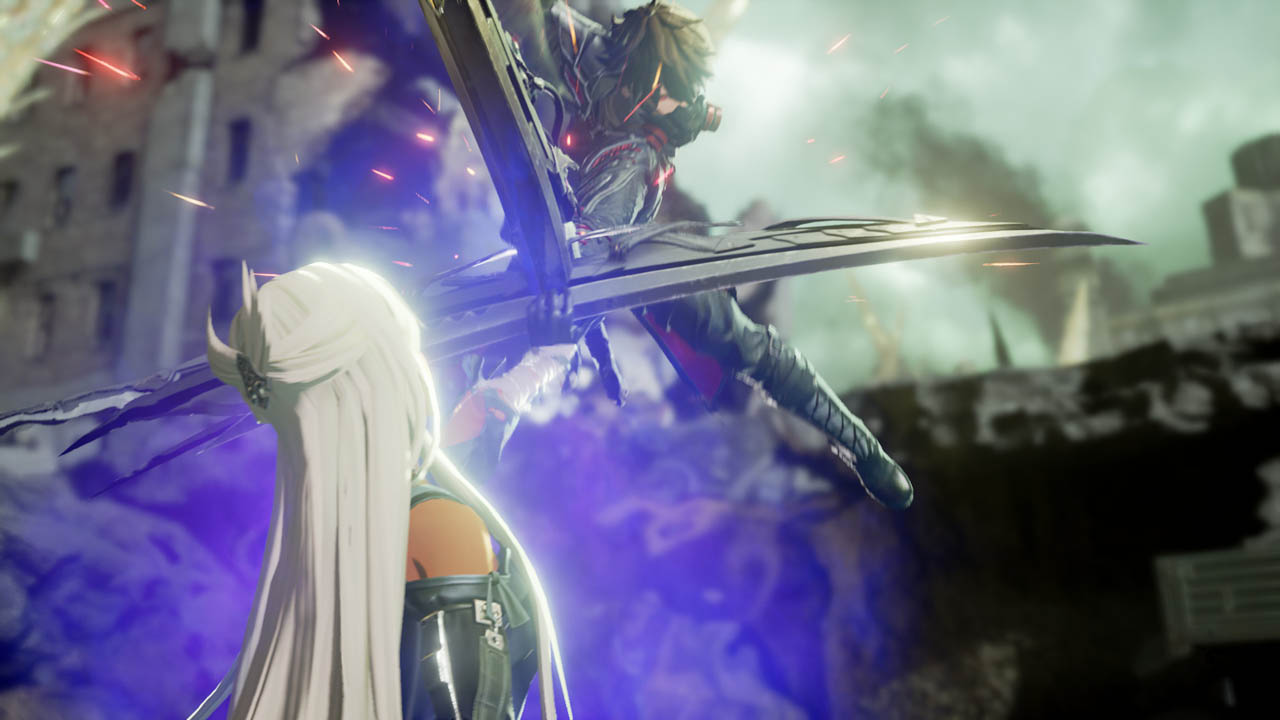
CHALLENGE YOURSELF
The difficulty here, punishing blows by enemies and a requirement to learn your enemy attack patterns if you want to survive, is rather manageable despite being somewhat like a Souls game in some respects. With time, enemies become predictable. The Cathedral is where the difficulty ramps up noticeably: the previous boss is far easier than the invasions in this area. This is also the area that forced me to rethink my build and play style altogether.
If you want to increase the challenge, don’t bring a companion. They’re quite useful — they can even do the bulk of the damage output during a boss fight. Want even more challenge? Don’t level your character. Leveling requires haze, which is easy to farm, and more difficult enemies drop more haze. Leveling isn’t quite essential, but it makes exploring magnitudes easier. How else you may strengthen your character involves upgrading and transforming weapons and blood veils using haze and certain items.
ROOM FOR IMPROVEMENT
Several aspects could use some tweaking. The idea of playing this multiplayer and earning rewards and ranks? Sounds great. But, I’ve yet to come across a distress signal someone else is sending out except for once. My newly met partner encountered a rather untimely death a minute or so into the venture by falling into a hole, which kicked me out of the multiplayer instance. You may send out your own, but this is for if you’re in need of help with an area or boss and I’m unsure how willing another player would be to stick around just to clear an area. Besides, I’d rather help someone else so I can earn those medals.
A more pressing issue is the collision detection. A few times, an enemy’s weapon would clip through a barrier you’re unable to walk through and hit your character, while other times I’ve seen a sweeping strike go straight through an enemy and not cause any damage or staggering, for which I got punished. These moments aren’t frequent, but it does render combat less predictable than a game like this needs to be. Another issue involved the game simply not starting up: either the engine would crash or some other error message would pop up. But, this only occurred for the first few days of playing. Yet another bug occurred after certain cutscenes: a different blood veil would get equipped onto my character, although my stats remained unchanged as if the blood veil hadn’t switched. The biggest glitch was when all of my gifts suddenly would refuse to activate. My ichor was at max, so that wasn’t an issue. I tried equipping a different active skill, but couldn’t because they were all in use somehow. I had to exit the game to fix this one. Fortunately, this only occurred once.
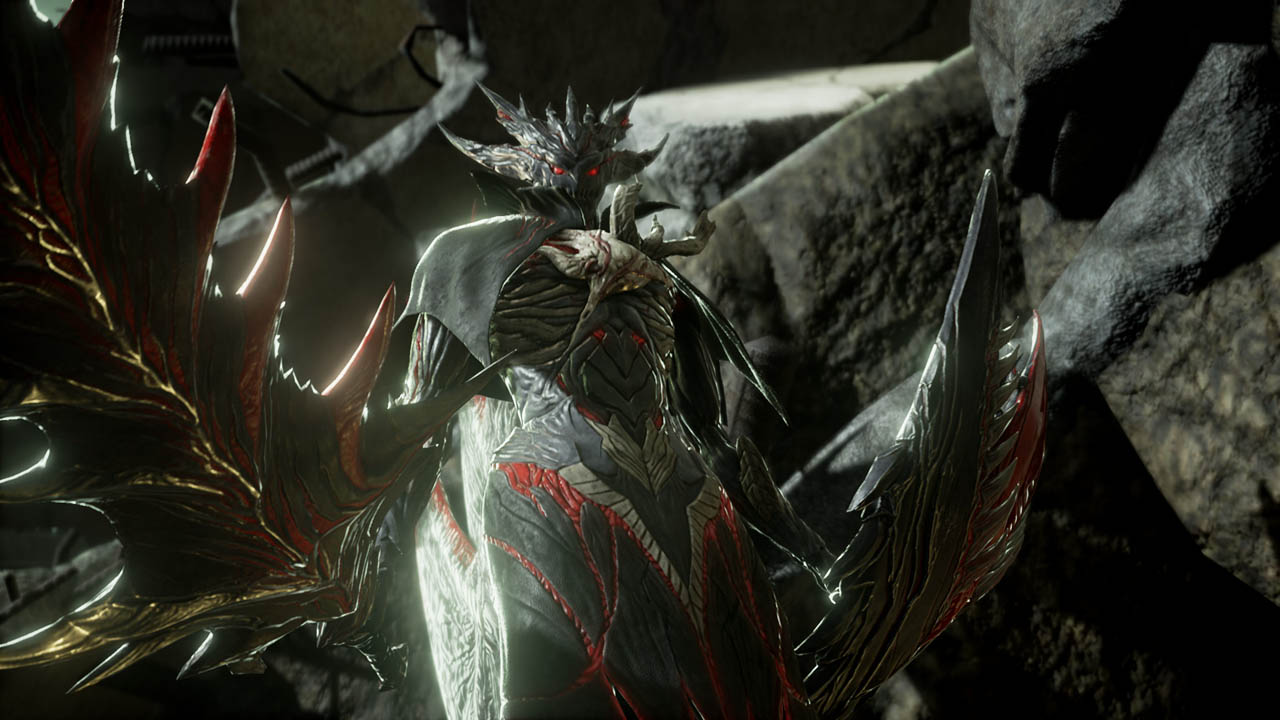
The Verdict: Great
Both fans of Souls-like titles and those who find such releases too challenging might find CODE VEIN to be a great in-between. With as many customization options as this game provides, both for appearance and equipment to fit your playstyle, this RPG has a lot to offer. There are several issues that will hopefully get fixed, but they aren’t frequent enough to mar the experience. I would like to try the multiplayer mode more, however, and hope it becomes more accessible.
